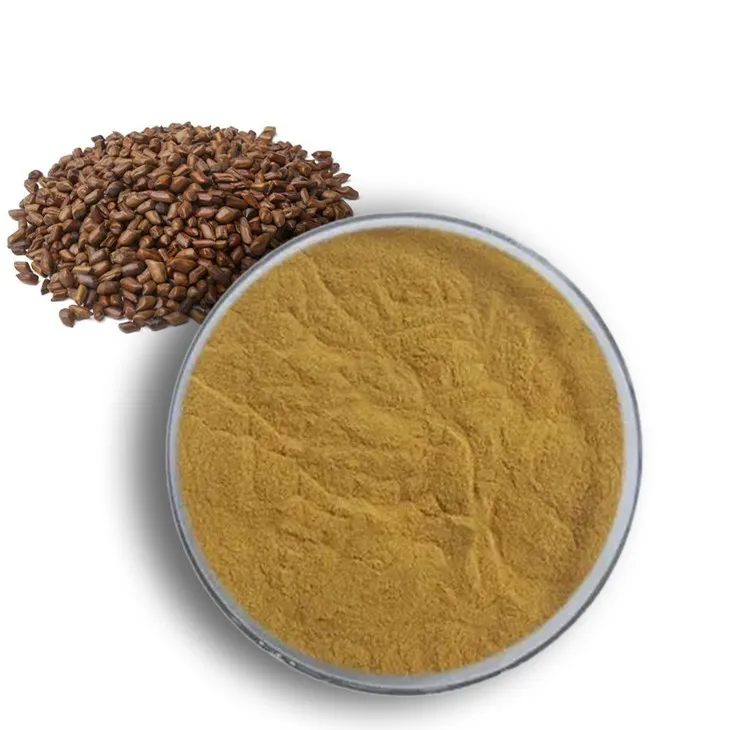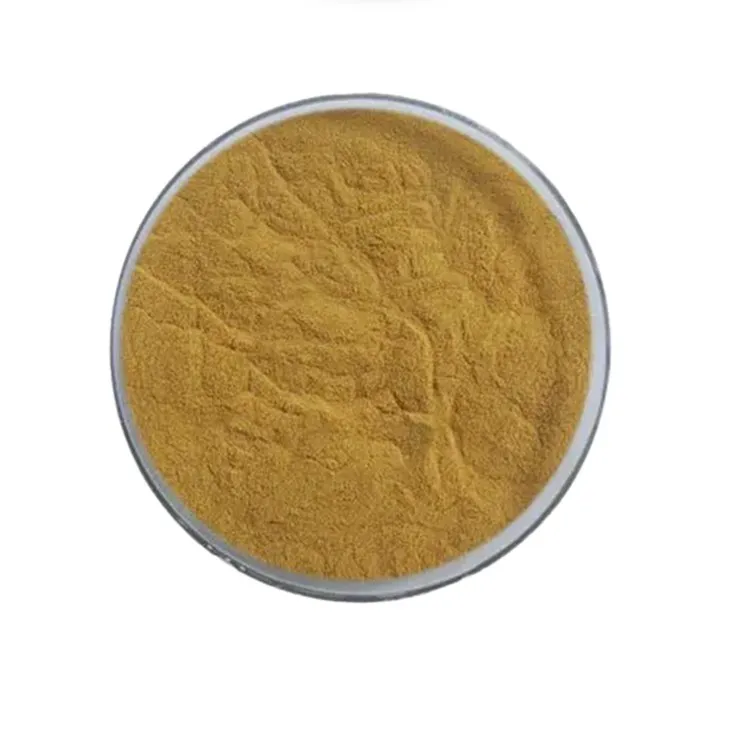- 0086-571-85302990
- sales@greenskybio.com
Five Efficacy of Cassia Seed Extract + Dosage, Side Effects
2024-11-12

I. Introduction
Cassia seed, a common traditional Chinese medicine material, has been widely used for centuries. The extract of cassia seed contains a variety of bioactive components, which endow it with multiple beneficial effects. In this article, we will explore five main efficacies of Cassia Seed Extract, as well as its proper dosage and possible side effects.

II. Five Efficacies of Cassia Seed Extract
1. Antioxidant Activity
Cassia Seed Extract is rich in antioxidants such as flavonoids and phenolic compounds. Antioxidants play a crucial role in protecting the body from oxidative stress. Oxidative stress is associated with many diseases, including cardiovascular diseases, cancer, and neurodegenerative disorders. The antioxidants in cassia seed extract can scavenge free radicals, which are highly reactive molecules that can damage cells, DNA, and proteins. By neutralizing these free radicals, the extract helps to maintain the integrity of cells and tissues, and may slow down the aging process.
2. Hypolipidemic Effect
Studies have shown that cassia seed extract can effectively reduce lipid levels in the blood. It can lower levels of total cholesterol, triglycerides, and low - density lipoprotein cholesterol (LDL - C), while increasing high - density lipoprotein cholesterol (HDL - C). High levels of LDL - C are a major risk factor for atherosclerosis, a condition in which plaque builds up in the arteries, leading to reduced blood flow and an increased risk of heart attacks and strokes. By improving lipid profiles, cassia seed extract may help to prevent and treat cardiovascular diseases.
3. Hypoglycemic Effect
Another important efficacy of cassia seed extract is its hypoglycemic effect. It can regulate blood glucose levels by improving insulin sensitivity and promoting glucose uptake in cells. For diabetic patients, this can be very beneficial. Insulin resistance is a key factor in the development of type 2 diabetes, and cassia seed extract may help to overcome this resistance, thereby reducing blood glucose levels. However, it should not be used as a substitute for diabetes medications without medical advice.
4. Anti - inflammatory Effect
Cassia seed extract has anti - inflammatory properties. It can inhibit the production of inflammatory cytokines and mediators, such as interleukin - 6 (IL - 6) and tumor necrosis factor - α (TNF - α). Inflammation is involved in many chronic diseases, including arthritis, inflammatory bowel disease, and asthma. By reducing inflammation, the extract may relieve symptoms and improve the quality of life for patients with these conditions.
5. Liver Protection
The extract of cassia seed can also protect the liver. It can prevent liver damage caused by toxins, drugs, or other harmful substances. It may promote liver cell regeneration and improve liver function. Liver diseases are a major health problem worldwide, and natural products with liver - protecting effects are highly desirable. Cassia seed extract may be a potential candidate for the prevention and treatment of liver diseases.

III. Dosage of Cassia Seed Extract
The appropriate dosage of cassia seed extract may vary depending on factors such as the form of the extract (e.g., powder, capsule, tincture), the intended use, and individual differences.
- For general health maintenance, a daily dose of 1 - 3 grams of cassia seed extract powder may be sufficient. This can be taken with water or added to food.
- If used for specific health conditions such as high cholesterol or blood sugar, a higher dose may be required, but this should be determined under the guidance of a healthcare professional. In some cases, the dose may range from 3 - 6 grams per day.
- When taking cassia seed extract in the form of capsules, follow the instructions on the product label. Usually, the recommended dose is stated clearly.

IV. Side Effects of Cassia Seed Extract
While cassia seed extract has many potential benefits, it may also cause some side effects in certain individuals.
- Gastrointestinal Disturbances: Some people may experience nausea, vomiting, diarrhea, or abdominal pain after taking cassia seed extract. This may be due to the irritating effect of the extract on the gastrointestinal tract. To reduce the risk of such side effects, it is advisable to start with a low dose and gradually increase it.
- Allergic Reactions: Allergic reactions to cassia seed extract are rare but possible. Symptoms may include skin rash, itching, swelling, or difficulty breathing. If any allergic symptoms occur, stop taking the extract immediately and seek medical attention.
- Interaction with Medications: Cassia seed extract may interact with certain medications. For example, it may enhance the hypoglycemic effect of diabetes medications, leading to a risk of hypoglycemia. It may also interact with medications for high blood pressure or heart disease. Therefore, if you are taking any medications, inform your doctor before using cassia seed extract.

V. Conclusion
Cassia seed extract has a range of potential health benefits, including antioxidant, hypolipidemic, hypoglycemic, anti - inflammatory, and liver - protecting effects. However, proper dosage and caution are necessary to avoid potential side effects. Before using cassia seed extract for health purposes, it is advisable to consult a healthcare professional, especially if you have underlying health conditions or are taking medications.
FAQ:
What are the five main efficacy of Cassia seed extract?
Cassia seed extract has several notable efficacies. Firstly, it may have antioxidant properties, which can help combat oxidative stress in the body. Secondly, it could potentially assist in improving eyesight, as it contains certain compounds beneficial for eye health. Thirdly, it might have a positive impact on digestion, promoting better gastrointestinal function. Fourthly, it may play a role in reducing inflammation in the body. Fifthly, it could potentially help in regulating blood lipid levels.
How should Cassia seed extract be dosed?
The dosage of Cassia seed extract can vary depending on various factors such as the form of the extract (powder, capsule, etc.), the intended use, and individual health conditions. In general, when taken in supplement form, it is often recommended to follow the instructions on the product label. However, it is also advisable to consult a healthcare professional before starting any new supplement regimen. They can provide personalized dosage recommendations based on factors like age, overall health, and any pre - existing medical conditions.
What are the possible side effects of Cassia seed extract?
Some possible side effects of Cassia seed extract may include gastrointestinal discomfort such as diarrhea, abdominal pain, or nausea in some individuals. Additionally, in large doses or with long - term use, it may potentially have adverse effects on the liver. However, these side effects are not common for everyone, and many people tolerate the extract well when used appropriately.
Can Cassia seed extract be used by everyone?
No, Cassia seed extract may not be suitable for everyone. Pregnant and breastfeeding women should avoid using it as there is not enough research to determine its safety during these periods. People with pre - existing liver or kidney problems should also consult their healthcare providers before using Cassia seed extract, as it may potentially exacerbate their conditions.
How long does it take to see the effects of Cassia seed extract?
The time it takes to see the effects of Cassia seed extract can vary widely. For some people, they may notice minor improvements in digestion or a reduction in inflammation - related symptoms within a few weeks of starting use. However, when it comes to more long - term effects such as significant improvements in eyesight or blood lipid regulation, it may take several months of consistent use. It is important to note that individual responses can be different based on factors like overall health, diet, and lifestyle.
Related literature
- The Pharmacological Properties of Cassia Seed Extract"
- "A Review on the Efficacy and Safety of Cassia Seed Extract in Traditional Medicine"
- "Cassia Seed Extract: Dosage Considerations and Clinical Evidence"
- ▶ Hesperidin
- ▶ citrus bioflavonoids
- ▶ plant extract
- ▶ lycopene
- ▶ Diosmin
- ▶ Grape seed extract
- ▶ Sea buckthorn Juice Powder
- ▶ Beetroot powder
- ▶ Hops Extract
- ▶ Artichoke Extract
- ▶ Reishi mushroom extract
- ▶ Astaxanthin
- ▶ Green Tea Extract
- ▶ Curcumin Extract
- ▶ Horse Chestnut Extract
- ▶ Other Problems
- ▶ Boswellia Serrata Extract
- ▶ Resveratrol Extract
- ▶ Marigold Extract
- ▶ Grape Leaf Extract
- ▶ blog3
-
High purity olive leaf extract
2024-11-12
-
Lavender oil extraction method
2024-11-12
-
100% organic virgin sea buckthorn fruit oil
2024-11-12
-
Lotus leaf extract powder factory in China
2024-11-12
-
China aged garlic extract supplier
2024-11-12
-
Deer antler extract powder manufacturer
2024-11-12
-
Saw palmetto extract vs whole herb
2024-11-12
-
Peppermint Extract Powder
2024-11-12
-
Sophora Japonica Flower Extract
2024-11-12
-
Berberis aristata Extract
2024-11-12
-
Beetroot juice Powder
2024-11-12
-
Phellodendron Extract
2024-11-12
-
Saw Palmetto Extract
2024-11-12
-
Scutellaria Extract
2024-11-12
-
Soy Extract
2024-11-12
-
Alisma Extract
2024-11-12
-
Mangosteen extract powder
2024-11-12





















